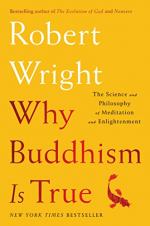
|
| Name: _________________________ | Period: ___________________ |
This quiz consists of 5 multiple choice and 5 short answer questions through Chapters 4-6.
Multiple Choice Questions
1. The author explains that the book Buddhism is True is an attempt to do all but which of the following things?
(a) To give people some idea of what lies beyond the door.
(b) To explain from a scientific standpoint why what lies beyond the door contains more reality than the one people have come to accept.
(c) To point out the window.
(d) To show people the door.
2. The author states that what feeling is linked to our modern environmental mismatch?
(a) Rage.
(b) Shame.
(c) Painful self-consciousness.
(d) Pride.
3. The author states that "More and more, groups of people define their identity in terms of" (17) what?
(a) Career.
(b) Sharp opposition to other groups of people.
(c) Family.
(d) Material wealth.
4. The author presents a scenario wherein someone imagines his or her speech is going to go badly, but it goes fine. What term does the author give to this phenomenon?
(a) A conundrum.
(b) A false positive.
(c) A metta experience.
(d) A triumph.
5. The Buddha said that engagement is the product of a what?
(a) A power.
(b) A lust.
(c) A shame.
(d) A feeling.
Short Answer Questions
1. Which group of people does the author say especially identified with the film he references within the chapter title "Take the Red Pill"?
2. What does the author NOT list among the most popular reasons for people to try meditation?
3. What emotion does the author NOT list as one that is likely to arise when one feels that meditation is not going well?
4. When ancient Buddhist writings mention the term sati, what does the word mean in English?
5. What is the name of the eminent twentieth-century scholar of Buddhism?
|
This section contains 293 words (approx. 1 page at 300 words per page) |

|




